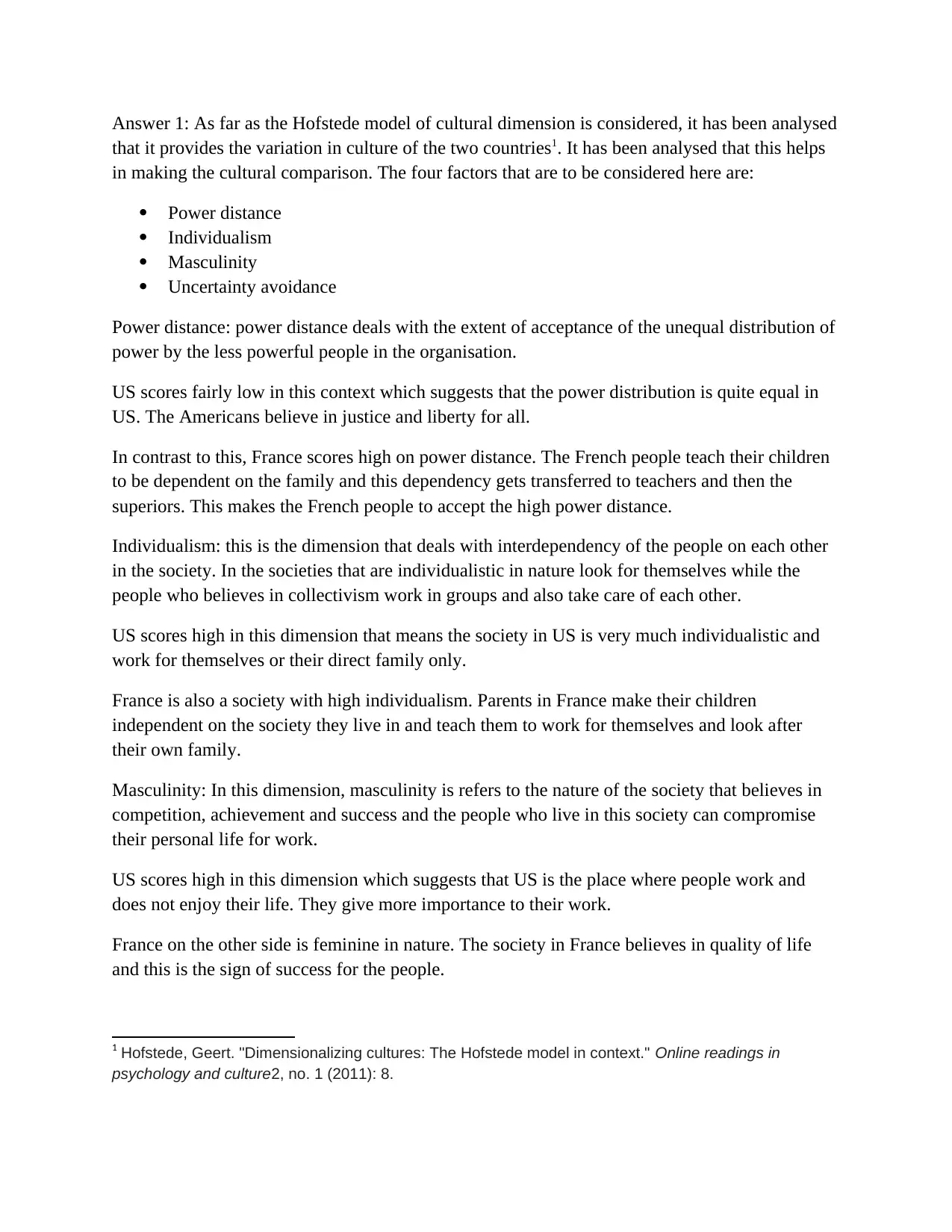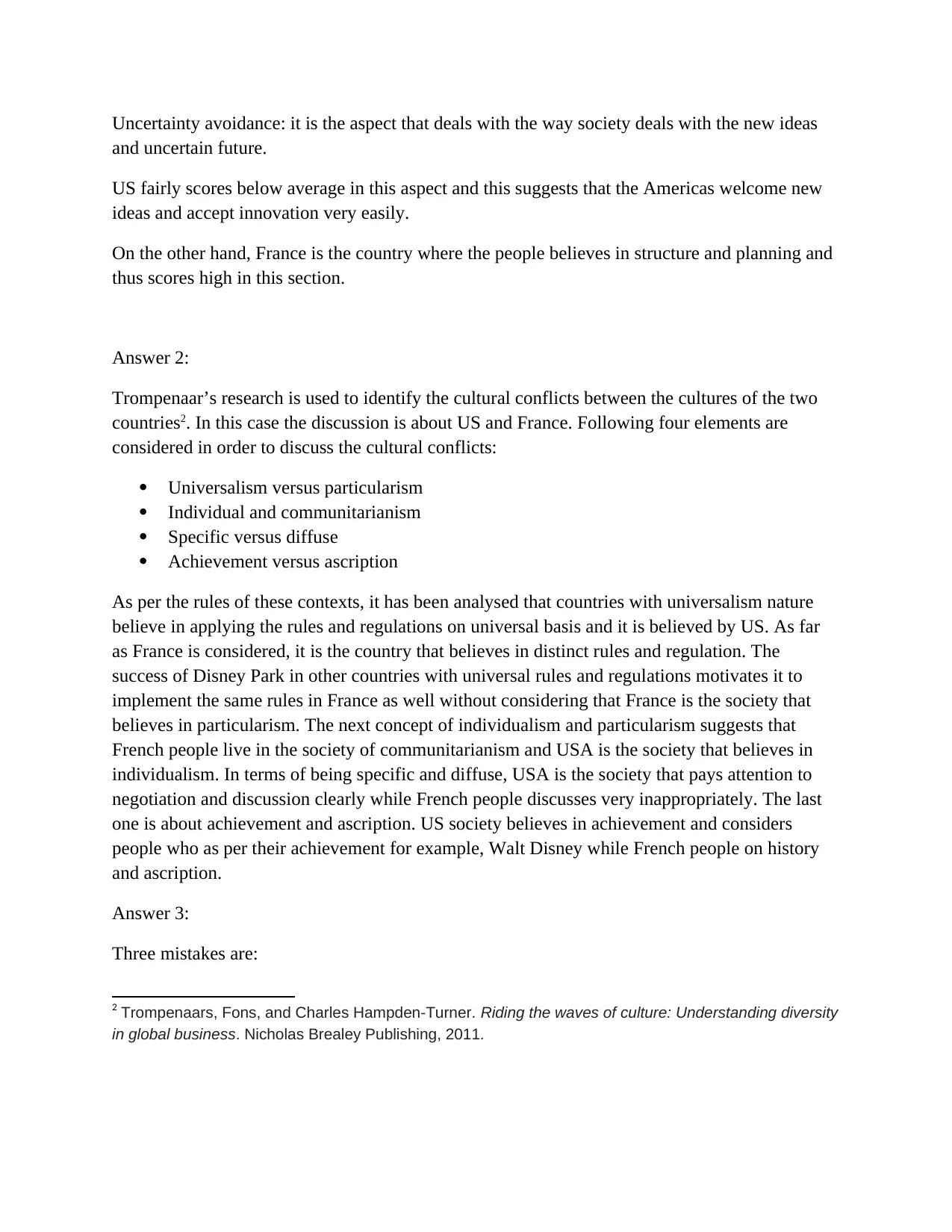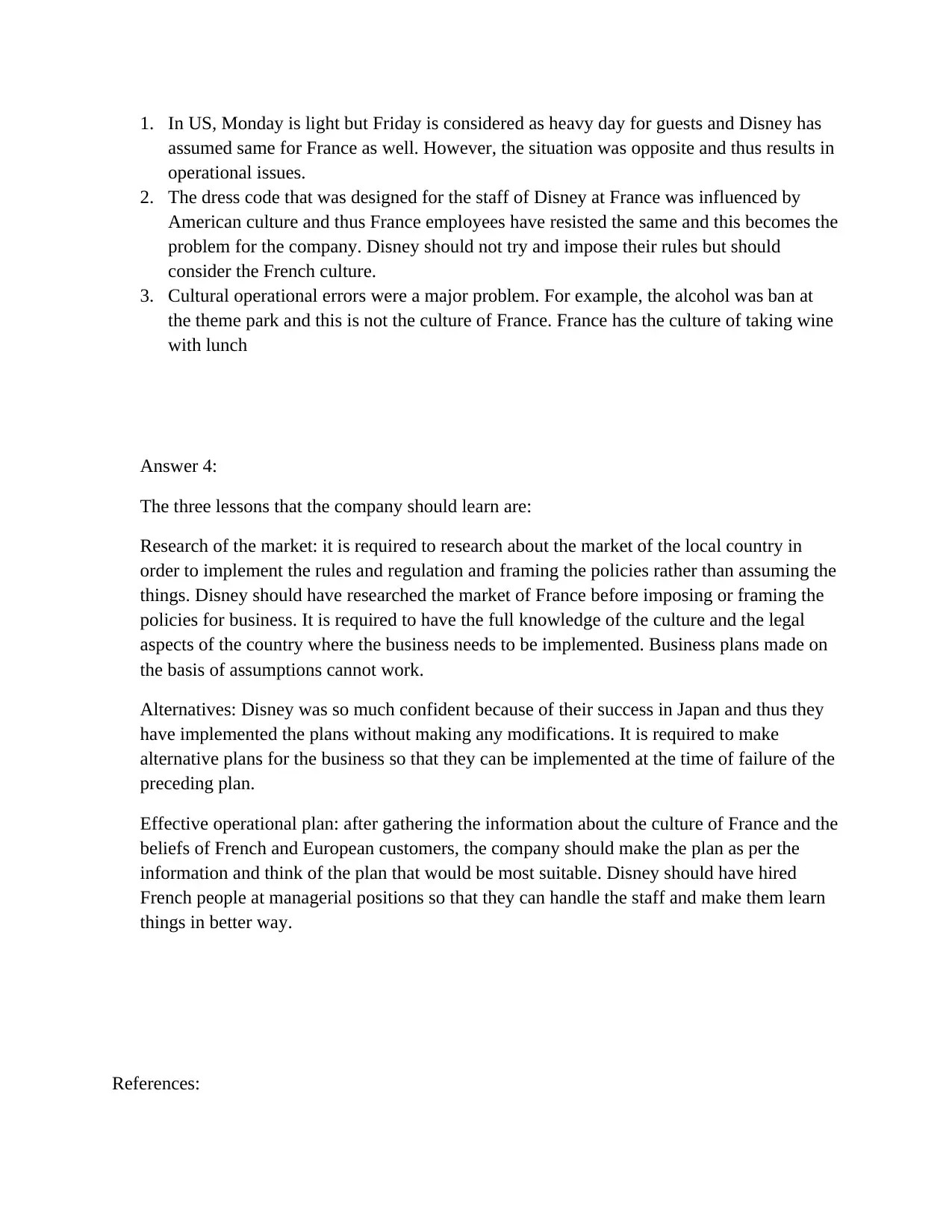Business Development: Euro Disney Case Study and Lessons Learned
VerifiedAdded on 2020/05/16
|5
|1098
|171
Case Study
AI Summary
This case study examines the challenges faced by Euro Disney, now Disneyland Paris, focusing on the cultural clashes between American business practices and French culture. The analysis uses Hofstede's cultural dimensions and Trompenaars' research to identify key differences in power distance, individualism, masculinity, uncertainty avoidance, universalism versus particularism, and other cultural aspects. The assignment highlights operational errors, such as misjudging customer preferences regarding park schedules, dress codes, and alcohol consumption. It concludes with crucial lessons for businesses expanding internationally, emphasizing the importance of thorough market research, contingency planning, and adapting operational plans to local cultural contexts, including the hiring of local staff in managerial roles. The document provides a comprehensive overview of the Euro Disney case, offering valuable insights into cross-cultural management and international business strategy.

EURO DISNEY CASE STUDY
Paraphrase This Document
Need a fresh take? Get an instant paraphrase of this document with our AI Paraphraser

Answer 1: As far as the Hofstede model of cultural dimension is considered, it has been analysed
that it provides the variation in culture of the two countries1. It has been analysed that this helps
in making the cultural comparison. The four factors that are to be considered here are:
Power distance
Individualism
Masculinity
Uncertainty avoidance
Power distance: power distance deals with the extent of acceptance of the unequal distribution of
power by the less powerful people in the organisation.
US scores fairly low in this context which suggests that the power distribution is quite equal in
US. The Americans believe in justice and liberty for all.
In contrast to this, France scores high on power distance. The French people teach their children
to be dependent on the family and this dependency gets transferred to teachers and then the
superiors. This makes the French people to accept the high power distance.
Individualism: this is the dimension that deals with interdependency of the people on each other
in the society. In the societies that are individualistic in nature look for themselves while the
people who believes in collectivism work in groups and also take care of each other.
US scores high in this dimension that means the society in US is very much individualistic and
work for themselves or their direct family only.
France is also a society with high individualism. Parents in France make their children
independent on the society they live in and teach them to work for themselves and look after
their own family.
Masculinity: In this dimension, masculinity is refers to the nature of the society that believes in
competition, achievement and success and the people who live in this society can compromise
their personal life for work.
US scores high in this dimension which suggests that US is the place where people work and
does not enjoy their life. They give more importance to their work.
France on the other side is feminine in nature. The society in France believes in quality of life
and this is the sign of success for the people.
1 Hofstede, Geert. "Dimensionalizing cultures: The Hofstede model in context." Online readings in
psychology and culture2, no. 1 (2011): 8.
that it provides the variation in culture of the two countries1. It has been analysed that this helps
in making the cultural comparison. The four factors that are to be considered here are:
Power distance
Individualism
Masculinity
Uncertainty avoidance
Power distance: power distance deals with the extent of acceptance of the unequal distribution of
power by the less powerful people in the organisation.
US scores fairly low in this context which suggests that the power distribution is quite equal in
US. The Americans believe in justice and liberty for all.
In contrast to this, France scores high on power distance. The French people teach their children
to be dependent on the family and this dependency gets transferred to teachers and then the
superiors. This makes the French people to accept the high power distance.
Individualism: this is the dimension that deals with interdependency of the people on each other
in the society. In the societies that are individualistic in nature look for themselves while the
people who believes in collectivism work in groups and also take care of each other.
US scores high in this dimension that means the society in US is very much individualistic and
work for themselves or their direct family only.
France is also a society with high individualism. Parents in France make their children
independent on the society they live in and teach them to work for themselves and look after
their own family.
Masculinity: In this dimension, masculinity is refers to the nature of the society that believes in
competition, achievement and success and the people who live in this society can compromise
their personal life for work.
US scores high in this dimension which suggests that US is the place where people work and
does not enjoy their life. They give more importance to their work.
France on the other side is feminine in nature. The society in France believes in quality of life
and this is the sign of success for the people.
1 Hofstede, Geert. "Dimensionalizing cultures: The Hofstede model in context." Online readings in
psychology and culture2, no. 1 (2011): 8.

Uncertainty avoidance: it is the aspect that deals with the way society deals with the new ideas
and uncertain future.
US fairly scores below average in this aspect and this suggests that the Americas welcome new
ideas and accept innovation very easily.
On the other hand, France is the country where the people believes in structure and planning and
thus scores high in this section.
Answer 2:
Trompenaar’s research is used to identify the cultural conflicts between the cultures of the two
countries2. In this case the discussion is about US and France. Following four elements are
considered in order to discuss the cultural conflicts:
Universalism versus particularism
Individual and communitarianism
Specific versus diffuse
Achievement versus ascription
As per the rules of these contexts, it has been analysed that countries with universalism nature
believe in applying the rules and regulations on universal basis and it is believed by US. As far
as France is considered, it is the country that believes in distinct rules and regulation. The
success of Disney Park in other countries with universal rules and regulations motivates it to
implement the same rules in France as well without considering that France is the society that
believes in particularism. The next concept of individualism and particularism suggests that
French people live in the society of communitarianism and USA is the society that believes in
individualism. In terms of being specific and diffuse, USA is the society that pays attention to
negotiation and discussion clearly while French people discusses very inappropriately. The last
one is about achievement and ascription. US society believes in achievement and considers
people who as per their achievement for example, Walt Disney while French people on history
and ascription.
Answer 3:
Three mistakes are:
2 Trompenaars, Fons, and Charles Hampden-Turner. Riding the waves of culture: Understanding diversity
in global business. Nicholas Brealey Publishing, 2011.
and uncertain future.
US fairly scores below average in this aspect and this suggests that the Americas welcome new
ideas and accept innovation very easily.
On the other hand, France is the country where the people believes in structure and planning and
thus scores high in this section.
Answer 2:
Trompenaar’s research is used to identify the cultural conflicts between the cultures of the two
countries2. In this case the discussion is about US and France. Following four elements are
considered in order to discuss the cultural conflicts:
Universalism versus particularism
Individual and communitarianism
Specific versus diffuse
Achievement versus ascription
As per the rules of these contexts, it has been analysed that countries with universalism nature
believe in applying the rules and regulations on universal basis and it is believed by US. As far
as France is considered, it is the country that believes in distinct rules and regulation. The
success of Disney Park in other countries with universal rules and regulations motivates it to
implement the same rules in France as well without considering that France is the society that
believes in particularism. The next concept of individualism and particularism suggests that
French people live in the society of communitarianism and USA is the society that believes in
individualism. In terms of being specific and diffuse, USA is the society that pays attention to
negotiation and discussion clearly while French people discusses very inappropriately. The last
one is about achievement and ascription. US society believes in achievement and considers
people who as per their achievement for example, Walt Disney while French people on history
and ascription.
Answer 3:
Three mistakes are:
2 Trompenaars, Fons, and Charles Hampden-Turner. Riding the waves of culture: Understanding diversity
in global business. Nicholas Brealey Publishing, 2011.
⊘ This is a preview!⊘
Do you want full access?
Subscribe today to unlock all pages.

Trusted by 1+ million students worldwide

1. In US, Monday is light but Friday is considered as heavy day for guests and Disney has
assumed same for France as well. However, the situation was opposite and thus results in
operational issues.
2. The dress code that was designed for the staff of Disney at France was influenced by
American culture and thus France employees have resisted the same and this becomes the
problem for the company. Disney should not try and impose their rules but should
consider the French culture.
3. Cultural operational errors were a major problem. For example, the alcohol was ban at
the theme park and this is not the culture of France. France has the culture of taking wine
with lunch
Answer 4:
The three lessons that the company should learn are:
Research of the market: it is required to research about the market of the local country in
order to implement the rules and regulation and framing the policies rather than assuming the
things. Disney should have researched the market of France before imposing or framing the
policies for business. It is required to have the full knowledge of the culture and the legal
aspects of the country where the business needs to be implemented. Business plans made on
the basis of assumptions cannot work.
Alternatives: Disney was so much confident because of their success in Japan and thus they
have implemented the plans without making any modifications. It is required to make
alternative plans for the business so that they can be implemented at the time of failure of the
preceding plan.
Effective operational plan: after gathering the information about the culture of France and the
beliefs of French and European customers, the company should make the plan as per the
information and think of the plan that would be most suitable. Disney should have hired
French people at managerial positions so that they can handle the staff and make them learn
things in better way.
References:
assumed same for France as well. However, the situation was opposite and thus results in
operational issues.
2. The dress code that was designed for the staff of Disney at France was influenced by
American culture and thus France employees have resisted the same and this becomes the
problem for the company. Disney should not try and impose their rules but should
consider the French culture.
3. Cultural operational errors were a major problem. For example, the alcohol was ban at
the theme park and this is not the culture of France. France has the culture of taking wine
with lunch
Answer 4:
The three lessons that the company should learn are:
Research of the market: it is required to research about the market of the local country in
order to implement the rules and regulation and framing the policies rather than assuming the
things. Disney should have researched the market of France before imposing or framing the
policies for business. It is required to have the full knowledge of the culture and the legal
aspects of the country where the business needs to be implemented. Business plans made on
the basis of assumptions cannot work.
Alternatives: Disney was so much confident because of their success in Japan and thus they
have implemented the plans without making any modifications. It is required to make
alternative plans for the business so that they can be implemented at the time of failure of the
preceding plan.
Effective operational plan: after gathering the information about the culture of France and the
beliefs of French and European customers, the company should make the plan as per the
information and think of the plan that would be most suitable. Disney should have hired
French people at managerial positions so that they can handle the staff and make them learn
things in better way.
References:
Paraphrase This Document
Need a fresh take? Get an instant paraphrase of this document with our AI Paraphraser

Hofstede, Geert. "Dimensionalizing cultures: The Hofstede model in context." Online readings in
psychology and culture2, no. 1 (2011): 8.
Trompenaars, Fons, and Charles Hampden-Turner. Riding the waves of culture: Understanding diversity
in global business. Nicholas Brealey Publishing, 2011.
psychology and culture2, no. 1 (2011): 8.
Trompenaars, Fons, and Charles Hampden-Turner. Riding the waves of culture: Understanding diversity
in global business. Nicholas Brealey Publishing, 2011.
1 out of 5
Related Documents
Your All-in-One AI-Powered Toolkit for Academic Success.
+13062052269
info@desklib.com
Available 24*7 on WhatsApp / Email
![[object Object]](/_next/static/media/star-bottom.7253800d.svg)
Unlock your academic potential
Copyright © 2020–2026 A2Z Services. All Rights Reserved. Developed and managed by ZUCOL.





